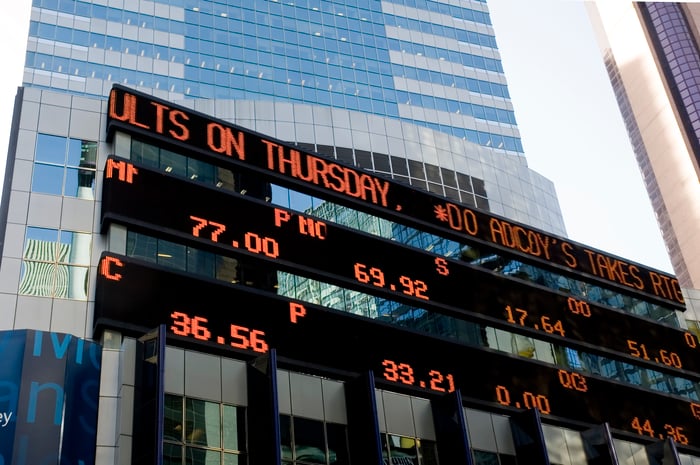For months, multiple recession-forecasting tools have been cautioning of an increased likelihood of a U.S. recession. Now, the nation's central bank concurs.
Two weeks ago, the minutes from the Federal Open Market Committee's March meeting contained the dreaded "r" word, recession. The 12-member body that oversees monetary policy decisions expects a "mild recession" to materialize later this year, with a recovery taking shape over the following two years.
Even though recessions are a normal part of the economic cycle, they can still put a hurting on Wall Street over the short run. Historically, two-thirds of the stock market's drawdowns occur during, not prior to, a recession.

Image source: Getty Images.
When the going gets tough on Wall Street, investors have a tendency to flock to historically profitable, time-tested businesses. In other words, the descriptor for virtually all 30 components that comprise the Dow Jones Industrial Average (^DJI 0.40%). The cash-flow stability provided by most Dow stocks makes them potentially smart buys during a recession.
But not all stocks within Wall Street's most iconic index are created equally. If the Fed is correct and a recession does occur later this year, two Dow stocks stand out as phenomenal buys, while history suggests another should be avoided like the plague.
Dow stock No. 1 to buy hand over fist if a recession takes shape: Johnson & Johnson
The first Dow stock that makes for a no-brainer buy if the U.S. economic growth shifts into reverse is healthcare conglomerate Johnson & Johnson (JNJ -0.46%).
The beauty of healthcare stocks is that, for the most part, they're highly defensive. As much as we'd prefer to not become ill during bear markets or economic downturns, we don't have that choice. Regardless of how well or poorly the U.S. economy is performing, demand for prescription drugs, healthcare services, and medical devices remains relatively constant.
For more than a decade, Johnson & Johnson has focused its attention on its pharmaceutical segment. J&J made this move to take advantage of the faster growth rates and higher margins associated with brand-name drugs. Although novel therapeutics have finite periods of sales exclusivity, J&J has covered its bases. It's constantly reinvesting in its pipeline, has entered into a number of drug-development/licensing partnerships, and hasn't been afraid to make the occasional acquisition.
To further minimize any pain from future patent cliffs, Johnson & Johnson also has its medical technologies segment to fall back on. With the global population aging and access to medical care improving, J&J's device segment should enjoy a fairly healthy ramp in sales and profits in the years and decades to come.
Continuity has been central to J&J's ongoing success as well. In the 137 years since the company was founded, it's had just eight CEOs. Having leaders stay in their positions for extended periods ensures that strategic initiatives are being implemented from start to finish.
Valued at less than 15 times Wall Street's forecast earnings for 2024, Johnson & Johnson is about as cheap as it's been in a decade.
Dow stock No. 2 to buy hand over fist if a recession takes shape: Verizon Communications
The second Dow component you can confidently buy hand over fist if the U.S. dips into a recession is telecom stock Verizon Communications (VZ 1.17%).
Similar to healthcare stocks, telecom stocks are also quite defensive. As time has passed, consumers have become less willing to give up their smartphones, wireless access, and/or broadband services. No matter what the U.S. economy throws at Americans, churn rates for wireless service providers remain relatively low.
Though Verizon's jaw-dropping growth days have long since passed, this is a company that can continue to modestly move the needle higher even if a mild recession takes place. The 5G revolution is a dangling carrot that should encourage consumers and businesses to take advantage of faster download speeds. Following a decade of 4G LTE download speeds, the emergence of 5G should increase data consumption -- and data is where Verizon's wireless division generates a significant portion of its operating margin.
However, Verizon's unsung hero might be its broadband operations. During the fourth quarter -- note, this was written up prior to Verizon reporting its first-quarter results on April 25 -- Verizon recognized 416,000 net broadband additions, which represent its best quarter for net additions in more than a decade. Verizon aggressively invested in midband spectrum in March 2021 with the intent of reaching 50 million households and 14 million businesses with its 5G broadband services by the end of 2025. This investment looks to be paying off.
Another reason investors can trust in Verizon is the company's payout. Verizon is currently doling out a 7% yield yet is paying out only 56% of Wall Street's forecast earnings for 2023 as a dividend. There doesn't appear to be any danger of a dividend cut.
On top of a 7% yield that's helping to keep investors above water, Verizon is trading for less than 8 times consensus earnings forecasts for 2023 and 2024. The risk-versus-reward profile certainly favors optimists at this point.

Image source: Getty Images.
The Dow stock to avoid like the plague if a recession occurs: Boeing
However, not all Dow stocks will necessarily be smart buys if a recession takes place. Commercial airline and defense company Boeing (BA 0.25%) is the perfect example of a Dow stock to avoid like the plague if a recession occurs.
To be upfront, Boeing is a company that I feel will do just fine over the long term (i.e., more than five years out). Boeing ended 2022 with a robust backlog of $404 billion, which included over 4,500 commercial airplanes. Having such a sizable backlog should lead to predictable operating cash flow more often than not.
There's also an opportunity for Boeing to really ramp up its cash-flow generation in the years to come with the 737 MAX. The plan is for the company to produce 52 737 MAX jets per month by January 2025, which would match its monthly production prior to the COVID-19 pandemic. For context, Boeing began 2023 producing 31 737 MAX jets per month.
But when a recession arises, Boeing is one of Wall Street's worst performers. Over the past five recessions, Boeing has lost an average of 40.1%. That's the worst performance among the S&P 500's components and all the more reason for investors to keep their distance.
The Federal Reserve's hawkish monetary policy is another concern for Boeing. Rapidly rising interest rates aren't typically good news for businesses lugging around a significant amount of debt. Boeing closed out 2022 with $57 billion in debt on its balance sheet. It wouldn't also be a surprise if commercial airlines, many of which are deeply indebted, pare back new orders as interest rates rise.
To boot, weakness in oil demand that often accompanies a recession would be expected to lower the spot price of crude oil. Lower fuel oil costs may create less of an incentive for commercial airlines to upgrade/update their fleets.
The icing on the cake, if you will, is that Boeing halted deliveries of some 737 MAX jets due to quality issues from one of its suppliers. While this is far different from the regulatory scrutiny that grounded the 737 MAX in the past, it's just another in a series of miscues for the jet that's supposed to represent Boeing's future.
If your time horizon is 2030, Boeing can be a moneymaker. But if you're looking six-to-12 months out, Boeing's history suggests it's not worth the trouble.





